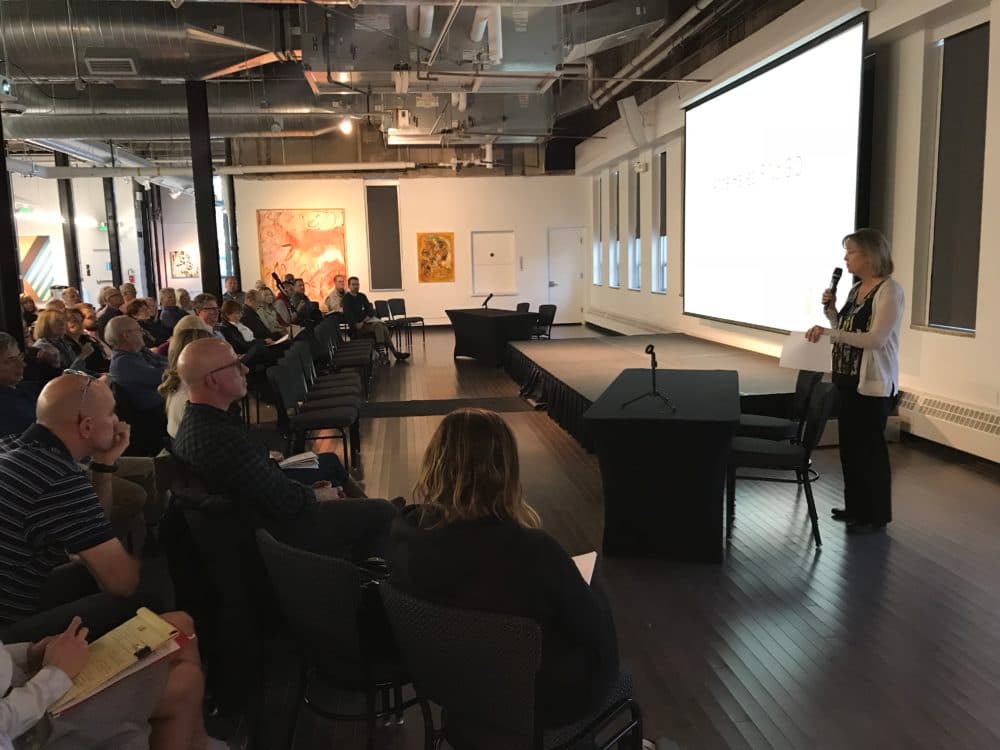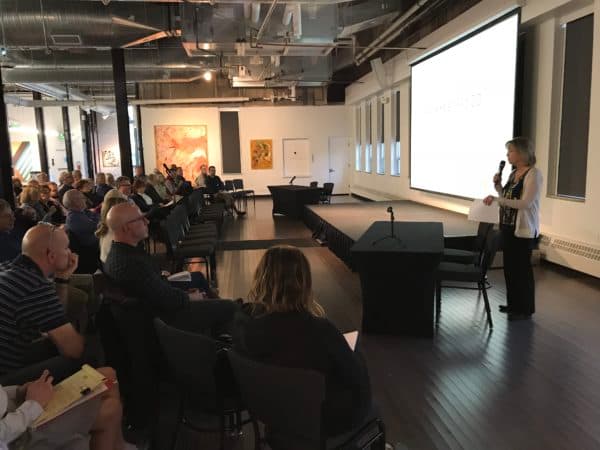
When Golden Triangle’s Neighborhood Plan was ratified in 2014, it provided a blueprint for all the possible changes and improvements the eclectic neighborhood sought as it moved toward.
The thing is, such changes cost money.
That's why the Golden Triangle Partnership, an organization made up of residents and local stakeholders, started exploring the possibility of establishing a financial tool called a general improvement district.
A GID would derive money from properties and renters in the neighborhood and provide a funding base for the numerous projects sought by the neighborhood. RiNo currently operates a GID; we've referred to GIDs and their cousins, business improvement districts, as a kind of 'mini-governments' in the past, since they can help bring new services and improvements to neighborhoods.
During a meeting Wednesday, the partnership presented findings from a feasibility study by Centro, a planning company, which showed how the city could potentially benefit from creating a GID.
Centro president Jamie Licko -- who is also president of the RiNo Art District -- led a presentation of the plan. Funding for the GID comes from property assessment from commercial and residential properties, but there’s some flexibility over how properties are assessed.
Many people in attendance didn’t seem too keen on the plan.
One local property owner, Robert Eber, said he's skeptical of the plan because he’s unsure how the money he would have to contribute would be used (he estimated for him, it could be as much as $22,000). Many in attendance clapped when he stood up and expressed concerns, saying he wasn’t sure it was the best possible way to raise money for the various projects.
Another audience member, Dominique G. Cook, stood up and denounced the plan. She said she’s circulating a petition against establishing a GID.
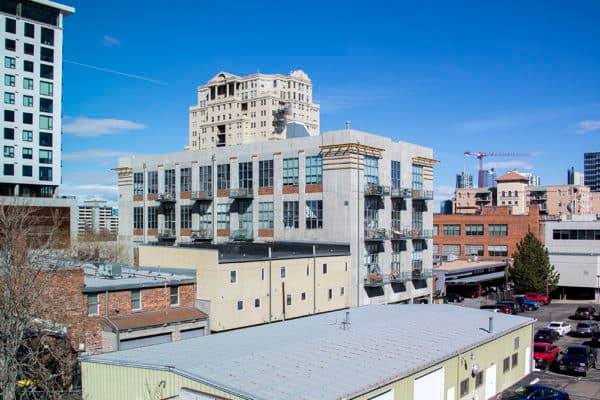
How would a GID be established?
Establishing a GID would take some time. GIDs are enabled by state statute, Licko said.
First, a plan for the GID would have to be created. Then, a petition signed by at least 200 “qualified electors” or 30 percent of qualified electors (whichever is less) supporting its creation would be required. Those petitions are then submitted to City Council, which prompts public hearings that can eventually lead to the council establishing an ordinance forming the GID.
After that, an election through mail ballot take place. Licko said only qualified electors would be allowed to vote. This would include commercial property owners, individual residential owners, individual residential renters who are registered to vote in the neighborhood, and a designated individual from a corporation who own property.
Businesses or businesses owners, unless they live in the neighborhood or own property, don’t get a vote.
This brought up another issue raised by people in attendance. Some found it unfair that someone who is renting locally could have an equal vote in the process.
Another issue involves non-taxable property.
Non-taxable properties can be included in the GID assessment. That could be key, since by Centro’s estimate, some 58 percent of properties in the neighborhood are non-taxable. There are also numerous government buildings, including the State Capitol and Denver municipal buildings, that can’t be factored in.
Centro provided two scenarios for assembling three GID budget amounts. The recommended budget, $500,000, would involve assessing each property at 5.4 cents per square foot and would only involve residential and commercial buildings. If non-taxable properties were included, the same budget amount would be achieved by assessing each property at 4.8 cents per square feet.
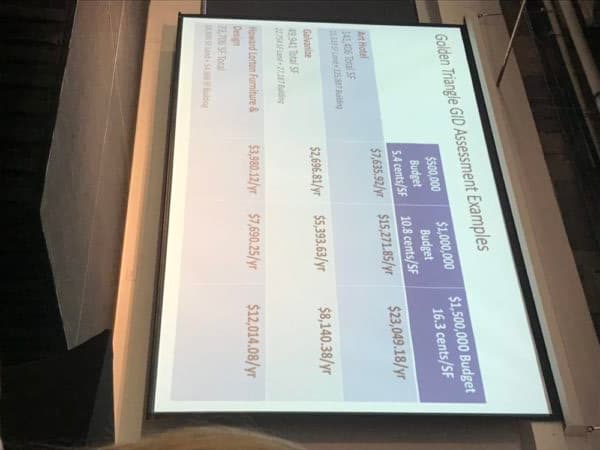
On the higher end, a $1.5 million budget would require assessing residential and commercial properties at 16.3 cents per square feet and 14.6 cents per square feet if non-taxable properties are included.
The money could be used to pay for some of the various needs and projects outlined in the city plan. It would be up to the GID members to decide how the money would be used: Upkeep of existing services and properties or creation of new ones. The GID is designed by participants to meet whatever needs they feel are most pressing.
One benefit of a GID would provide some guaranteed funding (and it would last as long as the term decided upon by a board overseeing the GID).
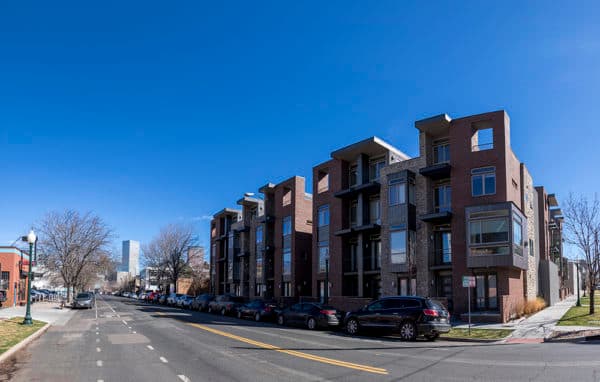
The money could be used for ongoing projects or "catalyst projects," like adding more pedestrian lighting, improving walkability, improving connectivity to other neighborhoods, developing greenway projects and installing more traffic calming measures.
"A lot of what we were looking to fund was infrastructure-based and maintenance based, and the GID does that very well," Licko said. "Another thing that is a good about GID is it allows both residents and the commercial sector to participate. A lot of other tools are residential only, or commercial only."
An online stakeholders survey found the highest priority among the 234 responders was safety in the neighborhood. It was available from Feb. 15 to March 16. The survey asked other questions: At least 40 percent said "yes" to wether or not GID would make the neighborhood a compelling place to live, work and spend time in. Forty-six percent said "yes" to a question over whether the GID would help them address challenges in the neighborhood.
Just 7 percent of respondents said a GID would likely not have much of an impact, while 10 percent said it would negatively impact businesses.
So what's next?
Centro will continue gathering public input for the possibility of creating a GID. But based solely on the reaction from a large portion of Wednesday's audience, it has some ways to go before a plan is presented that caters to the community's need.
A GID is not a requirement, and there's still no actual plan for how it could operate in the Golden Triangle. It's still very much in its infancy and will likely mean there will be more public meetings like Wednesday's.

